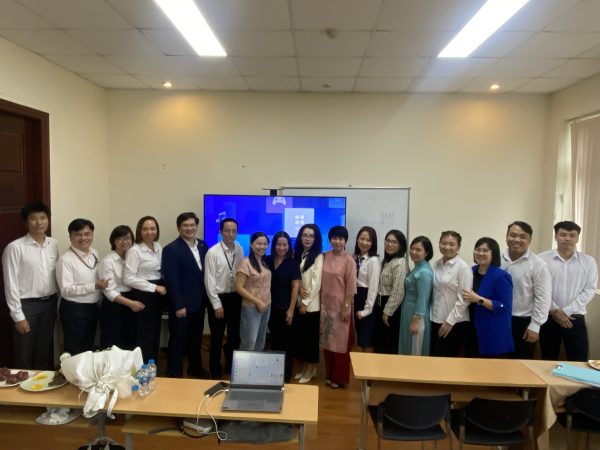As part of the Faculty Research Seminar for the first semester of the 2025–2026 academic year, the Faculty of Economics and Management – VNU- International School successfully held an academic seminar gathering lecturers, PhD candidates, and students.
The event served as a vibrant platform for sharing high-impact research on economic empowerment, innovation, and sustainability, promoting critical thinking and research engagement across the faculty.

The seminar featured three distinguished speakers.
Dr. Nguyen Tra My opened the session with her study titled “Tough and Silent – Assets, Power, and Protection Against Domestic Violence.” Using data from low- and middle-income countries, her research examined the relationship between women’s asset ownership and intimate partner violence (IPV). Findings revealed that joint asset ownership between spouses significantly reduces domestic violence, whereas individual ownership may sometimes provoke backlash effects due to shifts in household power dynamics. Dr. My emphasized the importance of strengthening gender equality legal frameworks and promoting women’s economic empowerment as key strategies to reduce domestic violence and enhance social equity.
Next, PhD Candidate Vu Quynh Loan presented her research titled “The Impact of Green Innovation on the Competitiveness of Vietnamese Seafood Exporters to the EU Market.” Using Minh Phu Seafood Corporation as a case study, the research demonstrated how green innovation (GI) plays a vital role in enhancing the competitiveness of Vietnamese firms under the EU’s stringent environmental standards. Initiatives such as green logistics, renewable energy adoption, electronic traceability, and sustainability certifications (ASC, MSC, GlobalG.A.P.) help firms not only maintain compliance but also elevate their brand image and expand market access.
The study recommended that Vietnamese enterprises and policymakers invest more in green technologies, leverage green finance, and pursue sustainable certifications to secure long-term competitiveness in global trade.
The final presentation was delivered by Dr. Dong Van Chung, titled “Does Innovation Influence Participation in Global Value Chains? – Micro Evidence from a Developing Country.” Drawing on multiple waves of World Bank Enterprise Survey (WBES) data, the research found that both product and process innovation significantly increase firms’ participation in global value chains (GVCs). Innovative firms are more likely to attract foreign partners, improve productivity, and expand export opportunities. Dr. Chung highlighted the strategic implications of these findings, calling for national policies to foster innovation and industrial upgrading as part of Vietnam’s broader economic integration strategy.
The seminar concluded successfully, reinforcing the spirit of research – innovation – and knowledge connection within . The event not only fostered academic dialogue but also inspired young scholars to pursue impactful, globally relevant research.


